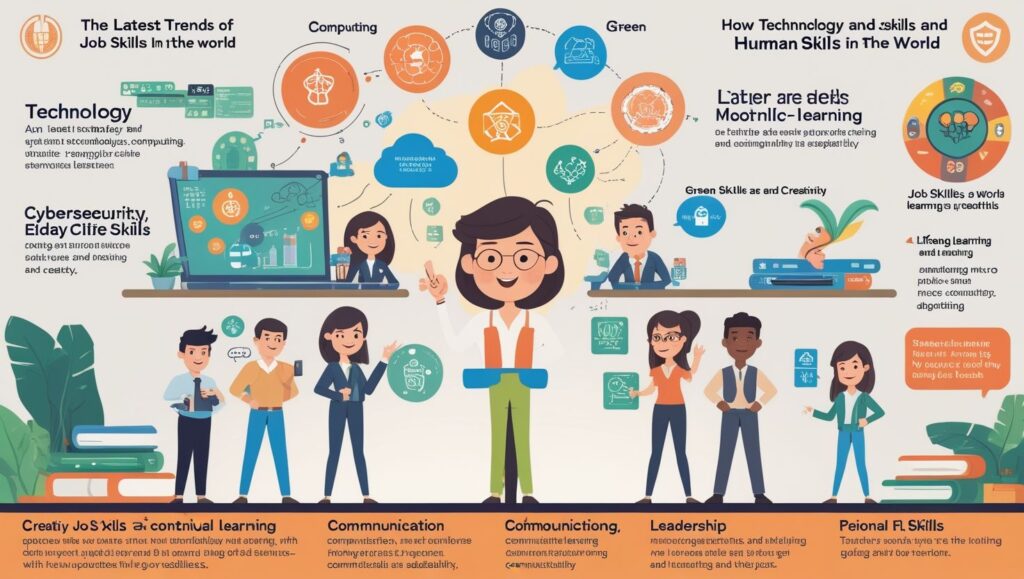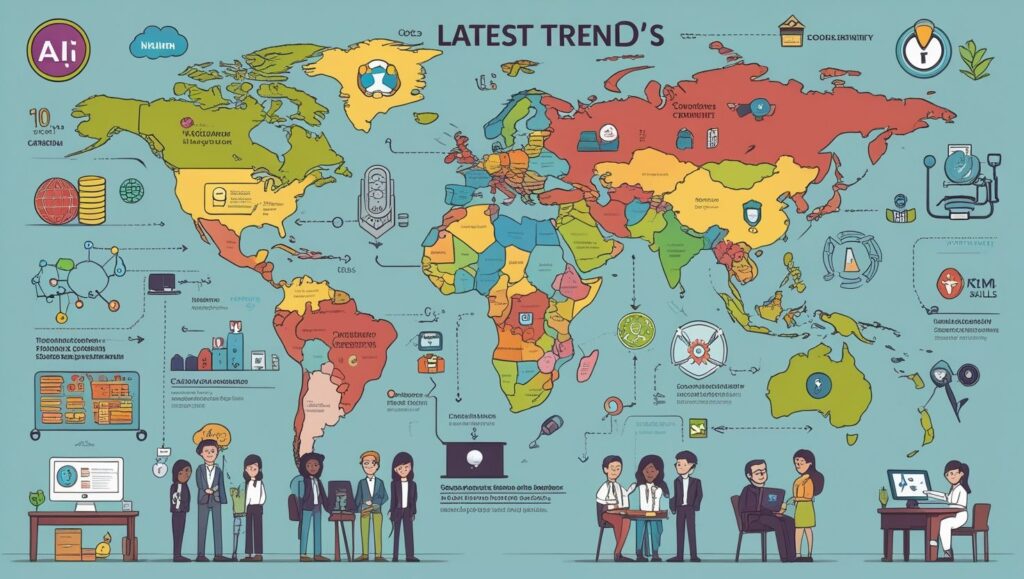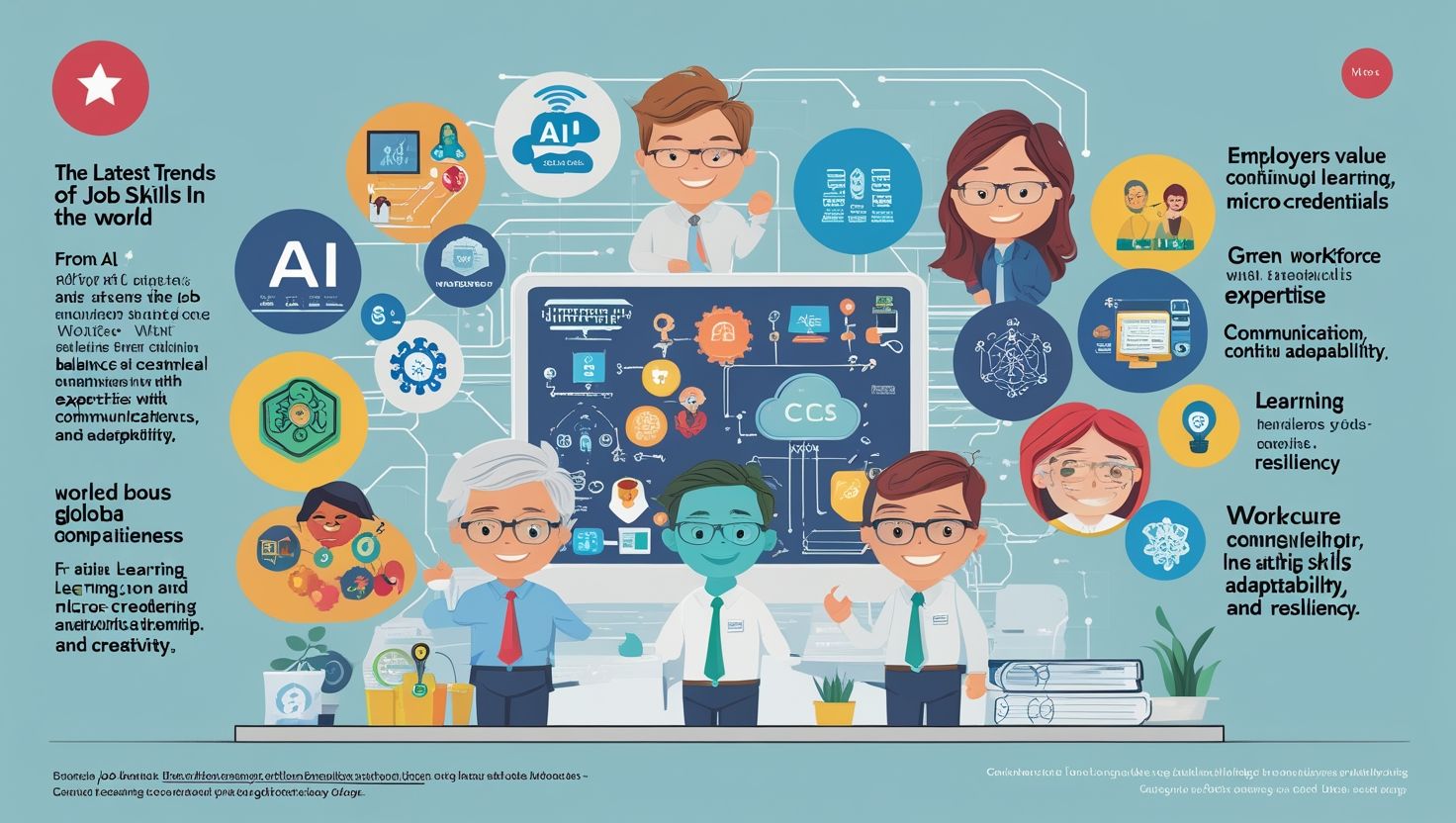Introduction
Latest Trends of Job Skills in the World, Latest Trends of Job Skills — this article explains what employers want now. It also shows what learners must build. Consequently, you will read clear, actionable sections. Each section is short. Each sentence is punchy. Moreover, transitional words guide you. Therefore, your reading stays smooth. In addition, this piece draws on leading reports and research. Specifically, insights from the World Economic Forum, LinkedIn, Coursera, McKinsey, and global analysis shape the arguments. Finally, use this as a roadmap. First, scan the headings. Then, focus on sections that match your goals. Bold words will highlight core ideas. Overall, the global skills landscape is fast-moving, but you can keep pace.
Why skills are changing so fast
Work is shifting. First, technology evolves quickly. Second, markets move unpredictably. Therefore, skills must also adapt. Moreover, automation alters tasks. Consequently, routine tasks shrink. Meanwhile, demand rises for people who can think and adapt. In addition, green transitions and global supply changes add new needs. So, both technical skills and human skills grow in value. Furthermore, employers now plan for rapid change. They report that a large share of core skills will be different by 2030. As a result, companies invest more in training. Therefore, continuous learning is not optional. Instead, it is mandatory. In short, the skills map is dynamic. Thus, plan to reskill and upskill often.
AI & Data: the top technical wave
Artificial intelligence and data skills dominate hiring lists. First, AI literacy means knowing tools and limits. Second, data literacy means reading and using data for decisions. Moreover, employers want people who can combine domain knowledge with AI tools. Consequently, skills like machine learning, prompt engineering, and data visualization are rising fast. In addition, workers who understand ethical AI and data privacy stand out. Therefore, learning both technical and ethical sides pays off. Meanwhile, micro-credentials and short courses help professionals bridge gaps quickly. Finally, companies expect AI to change job content, not just job counts. So, prepare to work with AI, not against it.
Digital literacy & cloud computing
Digital skill basics remain essential. First, cloud platforms power modern work. Second, employees must know cloud concepts and tools. Moreover, remote systems and collaboration run on cloud services. Therefore, familiarity with cloud storage, virtual machines, and SaaS is valuable. In addition, automation tools and low-code platforms let non-developers build solutions. Consequently, a broad digital literacy — from spreadsheets to cloud consoles — raises productivity. Meanwhile, employers reward people who can automate routine tasks. As a result, time frees up for higher-value work. Finally, combine digital literacy with critical thinking to unlock real impact. This mix creates a resilient skill set for the near future.

Software development & coding fundamentals
Coding remains a top pathway to opportunity. First, core programming skills help beyond pure engineering. Second, basic knowledge of APIs, version control, and testing is widely useful. Moreover, low-code and no-code tools shift some work away from deep engineering. However, deep software skills still enable system design and scale. Consequently, hybrid profiles — those who code and manage products — are especially sought. In addition, learning how software teams work is as important as syntax. Therefore, developers who communicate and collaborate climb faster. Finally, continuous practice through projects and contributions keeps skills sharp. Overall, coding builds logical habits that pay in many roles.
Cybersecurity: trust and resilience
Security skills are no longer niche. First, cyber threats grow with connected systems. Second, businesses must protect data and reputation. Therefore, skills in threat detection, incident response, and secure architecture are essential. Moreover, even small teams need basic security practices. Consequently, knowledge of access controls, encryption basics, and secure coding reduces risk. In addition, privacy regulation means compliance skills also matter. Thus, professionals who combine technical defensive skills with policy understanding are rare and valuable. Finally, cybersecurity learning paths often pair hands-on labs with certifications. As a result, practical experience accelerates hiring chances. Invest in security basics and advanced practices alike.
Green skills & sustainability know-how
Sustainability is becoming a job driver. First, the energy transition creates new roles in renewables and efficiency. Second, companies embed sustainability in operations and strategy. Therefore, skills in energy management, sustainable supply chains, and carbon accounting grow in demand. Moreover, green project planning and regulatory knowledge help land roles in many sectors. Consequently, workers who can measure impact and suggest reductions become strategic assets. In addition, interdisciplinary skills — combining engineering, policy, and finance — open more pathways. Finally, as economies decarbonize, green literacy will matter even in non-technical functions. So, add sustainability know-how to your toolkit now.

Creative and design skills
Creativity still wins. First, design skills help build products people love. Second, creativity fuels problem solving and innovation. Moreover, visual design, UX/UI, and experience mapping are highly sought. Therefore, proficiency with design tools plus user research skills produces effective designers. In addition, content creation and storytelling boost marketing and product work. Consequently, combining creative skills with data — such as A/B testing — leads to measurable outcomes. Meanwhile, AI tools assist creators, but human judgment remains vital. Finally, practice through real projects builds a portfolio that employers respect. So, keep learning creative tools and methods. They remain durable in a tech-heavy world.
Critical thinking & complex problem solving
Complex problems need clear thinkers. First, employers value people who break down messy issues. Second, analytical frameworks guide decision making. Therefore, critical thinking and structured problem solving are central. Moreover, combining domain knowledge with logical analysis reduces errors. Consequently, professionals who ask the right questions save time and money. In addition, scenario planning and hypothesis testing improve outcomes. Thus, practicing case studies and real projects strengthens these skills. Finally, soft skills like curiosity and skepticism support critical thinking. So, prioritize exercises that sharpen reasoning and testing. They pay off across careers.
Communication & collaboration (human skills)
Communication still tops many lists. First, clear writing and speaking create alignment. Second, cross-functional work needs strong collaboration. Moreover, remote work raises the bar for asynchronous communication skills. Therefore, people who explain complex ideas simply are prized. In addition, active listening and feedback skills support team performance. Consequently, soft skills often determine promotion trajectories. Meanwhile, cultural intelligence and inclusion skills help global teams succeed. Finally, combine human skills with technical knowledge for maximum impact. Together, they form the bridge between ideas and execution.
Leadership & social influence
Leadership evolves with new work models. First, leaders need to guide hybrid and diverse teams. Second, influence skills matter more than formal authority. Therefore, coaching, empowerment, and change management are in demand. Moreover, leaders must translate strategy into clear priorities. Consequently, skills like stakeholder management and negotiation are critical. In addition, ethical leadership builds trust in times of AI and change. As a result, leadership pathways include mentoring and rotational experiences. Finally, emerging leaders should practice communication, delegation, and strategic thinking. These skills create long-term career growth and organizational resilience.
Adaptability & lifelong learning mindset
Adaptability is essential. First, the pace of change is constant. Second, people who learn quickly outperform peers. Therefore, a lifelong learning mindset is a core career skill. Moreover, micro-learning, short courses, and on-the-job projects speed up skill gain. Consequently, employees who iterate on skills remain relevant. In addition, career flexibility — including lateral moves — builds resilience. Thus, plan learning sprints and reflect on progress regularly. Finally, digital badges and microcredentials document growth. So, adopt habits that make learning routine and measurable. McKinsey and others call this an upskilling imperative for entire workforces.
Emotional intelligence & resilience
EQ matters more than ever. First, emotional intelligence improves teamwork. Second, it supports conflict resolution and morale. Moreover, resilience helps workers manage stress and uncertainty. Therefore, skills like self-awareness, empathy, and regulation matter in leadership and individual contributors alike. In addition, teams that practice psychological safety innovate more. Consequently, training in coaching and feedback loops raises performance. Finally, combine EQ training with role practice for best results. Employers increasingly measure wellbeing and engagement as business metrics. Thus, emotional skills are both humane and strategic.

Micro-credentials, certificates & portfolio learning
Credentials are changing. First, short, targeted courses offer immediate signal to employers. Second, micro-credentials and professional certificates focus on job-relevant skills. Therefore, building a skills portfolio beats collecting generic degrees alone. Moreover, real projects and GitHub, Dribbble, or case writeups show applied ability. Consequently, hiring teams often look for demonstrable work. In addition, industry-recognized badges from Coursera, LinkedIn Learning, and others help. Thus, combine formal credentials with practical proof. Finally, continuous update of credentials keeps your profile competitive. Employers reward people who can both learn and demonstrate results.
How to prioritize learning today
First, audit your current skills. Second, map them to desired roles. Third, choose one technical and one human skill to develop concurrently. Moreover, use short courses and real projects to practice. Therefore, set measurable targets and timelines. In addition, seek mentorship and feedback early. Consequently, employers notice applied learning and impact. Meanwhile, balance depth with breadth: be T-shaped. Finally, invest in a learning portfolio with certificates and examples. This practical plan helps you stay future-ready. Remember, the best skill is the ability to learn the next skill quickly.
Conclusion — act now, learn continuously
To summarize, the Latest Trends of Job Skills favor a blend of technical fluency and human strengths. First, AI, data, and cloud skills lead technical demand. Second, cybersecurity, green skills, and creative design also grow rapidly. Moreover, soft skills like communication, leadership, and emotional intelligence remain crucial. Therefore, lifelong learning and micro-credentials are practical levers. In addition, employers are investing in upskilling programs. Consequently, individuals who learn fast and show impact will win. Finally, start small, practice often, and document results. The future rewards those who adapt — so act now and keep learning.
References (authoritative sources)
- World Economic Forum — Future of Jobs Report 2025. World Economic Forum
- LinkedIn Learning — Workplace Learning Report 2025 (full report). LinkedIn Learning
- Coursera — Global Skills Report / Job Skills insights (2024–2025). Coursera+1
- McKinsey & Company — The upskilling imperative & digital skill building articles (2024–2025). McKinsey & Company+1
- Financial Times / IMF coverage on AI and labour risks (context on inequality and policy responses). Financial Times

9nwmmt